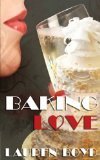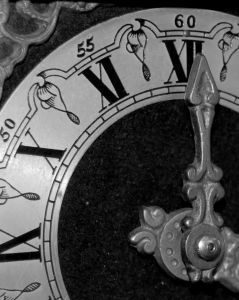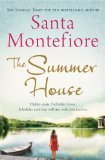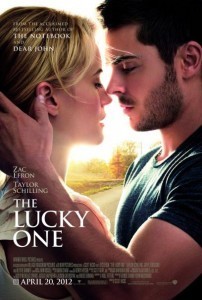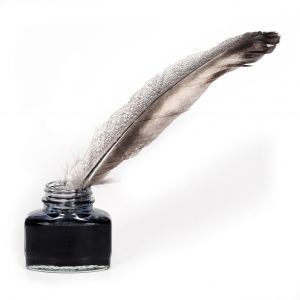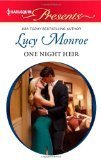Hannah Fielding's Blog, page 128
June 24, 2013
Book review: Baking Love by Lauren Boyd
From the blurb:
Three years ago, Kate Sullivan was prepared to tell her best friend, Eric Wagner, that she had developed romantic feelings for him. But before she could, he abruptly ended their friendship. Now Eric has walked into Kate’s bakery and back into her life – but why?
Will Kate finally get the chance to heat things up between them? Or will their relationship only ever be “cool to the touch”?
Baking Love is Lauren Boyd’s first published book and I was excited to read it when it was released earlier last month. It is a great read and a sweet, engaging story filled with fun and humour. Baking Love is the story of Kate, who has recently inherited her grandmother’s bakery in Hillsborough, and her love for her best friend, Eric, with whom she lost contact when he went to college in New York a few years before and got a girlfriend. The book is told entirely from Kate’s point of view, with some amusing internal dialogue which really allows you to understand Kate’s wit, strength and tenacity.
One day, while at work in the bakery, Kate meets with a bride to discuss her wedding cake and Kate cannot shake the bad air that sits between them – what is this woman’s problem?
She opened one of the photo albums on the table and turned it around to face Cecilia and Loraine. “This album as pictures of the wedding cakes we’ve done.”
“I’m not looking for something that’s been done,” Cecilia frowned. “I’m looking for originality.”
“Of course.” Kate opened the note book that was lying on the table and picked up the pen next to it. “Tell me what you’d like.”
Cecilia’s furrowed brows relaxed into a more satisfied expression. “I want my wedding cake to be unlike anything anyone’s ever seen. I want white cake, white frosting, and white fondant. I want pale yellow beadwork, lacework, scrollwork, and fondant flowers. It goes without saying that the decorations should be tasteful and not tacky.”
Yet you said it anyway.
When it turns out that Cecilia’s fiancé is Kate’s old best friend, Eric, Kate begins to understand – Cecilia does not want to use her bakery for her cake, it was Eric’s idea. Kate resolves to put her feelings for Eric aside and give her best friend the best wedding cake ever, despite his fiancé’s frostiness.
It is soon clear that there are some unresolved issues between Kate and Eric – not the least that Kate was in love with Eric before he went away, but was too afraid to tell him in case it ruined their friendship – and regret that they had lost touch since he left. It is clear that both of them want that friendship back and the friendly banter between them leaves them both at times confused about the status of their friendship. But are wedding rehearsals and preparations the best time to discuss these?
There are some great fun moments in the book, coming from awkward situations and wedding-related craziness which will have you chuckling away to yourself, and they really add to the depth of these characters and the connection between them. It really is a most enjoyable book to read and I look forward to reading more from Lauren Boyd. Although there is one warning for readers of Baking Love – it will make your mouth water with the most amazing descriptions of cakes and frosting…
Baking Love is available now from Amazon; click on the book cover below to visit the store.
June 20, 2013
Another stunning Riviera sunset
June 18, 2013
The opening up of the romance genre to self-publishing authors
I was fascinated to read a recent article in the Guardian Books section on the increasing success of self-published books in genre markets. According to the article:
The figures, from Bowker Market Research, show that while self-published books made up a tiny proportion – 2% – of all books purchased last year, this figure increases dramatically, to 12%, when print books are removed from the equation.
When just adult fiction and non-fiction ebooks are looked at, self-publishing’s share increases to 14% of the market, and in the crime, science fiction, romance and humour genres, self-publishing took more than 20%.
So, one in five romance ebooks purchased is by an independent author. Or, put another way, many readers are willing to try a self-published romance novel. Why? Here are my thoughts:
Romance readers are more open to trying a self-published novel: Sixty-eight per cent of buyers of self-published ebooks are female. And because most readers of romance novels are female, it makes sense that the romance genre is one that’s particularly open for independent authors.
Authors like EL James have paved the way for respecting self-published-based talent: The Fifty Shades of Grey author never self-published her books, but they famously began life published on a fan fiction website online, which lends credibility to those who don’t follow the traditional publishing route.
There are some good-quality self-published romance novels on offer: Professional, hardworking authors present engaging covers, well-edited text and superb marketing to match that of traditionally published authors.
Romance readers can easily ‘try before they buy’: We can assess the title, the cover, the blurb and the sample chapter for quality and suitability to fit our tastes before we commit to buy, which allows us to make informed decisions.
Romance novel reviews abound: I know from my own experience just how friendly and supportive romance book reviewers are worldwide, and many of them are willing to review self-published books. The result is plenty of reviewers helping readers connect with new romance writers via blogs, Amazon and Goodreads.
What do you think? Do you buy self-published novels? Do you check whether a book is self-published or traditionally published before you buy? If the quality is good, does the means of publication matter to you? Can you recommend any self-published romance novels?
June 16, 2013
Five reasons I write romance set in the ’70s and ’80s
An interesting gap exists in modern romance publishing. We have contemporary fiction, which is set in the modern time – usually the action predominantly takes place within a few years of the publication date. And we have historical fiction, which is usually seen as covering the period of history up to the end of the Second World War. So what of the latter half of the 20th century? Well, ‘contemporary history’ is a grey area, somewhat lost.
And yet, I choose to set books in the ’70s and ’80s. Not because I am an author who writes entirely to please a market, but because I am an author who must be true to herself and her experiences, and follow her heart when it comes to the ‘when’ of a story. Here are five reasons for my choice to write contemporary historical romance fiction:
The male/female relationships: Such a fascinating time for men and women. On the one hand, there was yet a traditional, old-fashioned feel to romance and to relationships which I find alluring – still chivalry from the man, still naivety for the woman, perhaps. And yet by the same token women were enflamed with the need to stake their newfound right to equality – they were fiery, resolutely independent, passionate, empowered – and the male, in response, had to negotiate a fine line between being alpha and protective, and being respectful and supportive.
The settings: Whatever country I choose as the setting for my novel, it was a different place in the ’70s and ’80s. Take Kenya, the setting for Burning Embers, in 1970. The new independence was shaping the politics, the culture and the very mood of the country. Traditions existed that modernity has stripped back. The country felt bigger, wilder, more dangerous – perhaps, to my mind, more beautiful. Overall, the energy of the time was different: in the ’70s, in particular, great rushes of freedom in societies evoked immense, exuberant, joyous passion which overspilled into the romantic arena.
The culture: Theatre, literature, music, art, architecture – all during these decades were full of colour and life. From rock to disco, pop art to neo-expressionism, culture was changing rapidly in exciting and inspirational ways. The perfect backdrop to forward-looking, colourful, vibrant love stories!
The fashions: Such rapid and novel innovations were made. For each character I write, I love to consider their clothing in keeping with the era. Self-expression through fashion was new but accepted, and women in particular had a wide choice of styles from which to choose. There were so many beautiful, sexy outfits on offer, just the attire for a female protagonist to attract her man. The shoes, the lengths, the fabrics, the cuts – even the jewellery: perfect to inspire the romantic imagination!
The experience: ‘Write about what you know’ is the golden rule of writing. As much as I love historical romances, I’ve never been a 19th-century princess in love with a peasant, so I find it a stretch to write that. And having been happily married for many years, I am not au fait with the latest dating protocols (Match.com? Facebook? GPS tracking?). I do, however, remember fondly being a girl in love and swept away with romance in the era in which I write, and so when I put pen to paper, all the memories flood back and I find I slot right into the romantic sensibility for writing.
What do you think when you imagine a story set in the ’70s and ’80s? Are these decades infused with romance for you? Do you feel the pull towards contemporary history? Which would you dub the most romantic of the 20th-century decades? I would love to hear your thoughts.
June 14, 2013
Book review: The Summer House by Santa Montefiore
From the blurb:
Antoinette’s world has fallen apart: her husband, the man she has loved for as long as she can remember, has died tragically in an accident. He was her rock, the man she turned to for love and support, the man she knew better than she knew herself. Or at least so she thought…For as she arrives at the familiar old stone church for George’s funeral, she sees a woman she has never met before. And in that instant, the day she thought would close a door on the past becomes the day that everything she has ever known is turned upside down. Phaedra loved George too, and she could not bear to stay away from his funeral. She only recently came to know him, but their bond was stronger than any she has ever felt before. As she sits before his wife, she knows that what she is about to reveal will change all their lives forever. Sometimes it takes a tragedy to reveal the truth. But what if the truth is harder to bear than the tragedy…?
Such a delightful book – deliciously thick and full of feeling. I love the maturity of the writing, and the fact that the author feels no need to gallop through at a fast pace, instead really exploring the emotions and thoughts of myriad characters in the aftermath of the death of George, the head of the family.
I found the characters likeable and believable, and I especially engaged with the two lead women, Antoinette and Phaedra (lovely names!). The author’s use of the omniscient narrator means we get inside many characters’ minds, although I have to say that at times I found the regular shifting about of perspectives mid-scene a little disorientating.
There’s a mystery at the heart of the book, introduced early on – a discomfort surrounding the characters of Phaedra and the George’s solicitor, Julius. The mystery builds to an explosive revelation towards the end of the book, though I must admit I had guessed the twist early on.
For me, the strengths of the book lie in the relationships between characters, and the poignant exploration of love and loss and moving on. The overall messages that come through are moving and meaningful, and one closes the book with a deep feeling of satisfaction.
The setting is also evocative – especially the scenes in Fairfield Park, Hampshire, the family’s Jacobean mansion surrounded by land. I love the folly (the summer house) which acts as the focal point; a place that comes to symbolise new hope and forgiveness.
Overall, this is a book to add to your summer reading list and to pick up when you want a deeper, slower, more poignant book.
The Summer House is available now from Amazon; click on the book cover below to visit the store.
June 13, 2013
Roses in my garden in France
June 11, 2013
Favourite film: The Lucky One
U.S. Marine Sergeant Logan Thibault (Zac Efron) returns from his third tour of duty in Iraq, with the one thing he credits with keeping him alive – a photograph he found of a woman he doesn’t even know. Discovering her name is Beth (Taylor Schilling) and where she lives, he shows up at her door, and ends up taking a job at her family-run local kennel. Despite her initial mistrust and the complications in her life, a romance develops between them, giving Logan hope that Beth could be much more than his good luck charm.
There is a strong tradition for wonderful romantic movies to be made based on Nicholas Sparks’ bestselling novels – think The Notebook, Dear John, A Message in a Bottle and A Walk to Remember. So when I heard they were making a film of The Lucky One, I knew at once it would be a poignant movie that would sweep me away – and how right I was!
This film is romance incarnate. It made me smile, it made me cry, and it gave me that wonderful ‘ah, love!’ feeling over and over again. The story is simple but powerful, but for me two things make the film jump out as being exceptional:
The hero: He makes the movie, evoking smouldering, intense on-screen chemistry. Gone is the boyish Zac Efron, replaced with a centred and mesmerising man who knows just how to make his female audience melt. A Marine, he’s a little more reserved and quiet than I’d usually prefer in a hero, but this only adds to the intensity of the film, and for me every word of his dialogue is spot on; for example, ‘You should be kissed every day, every hour, every minute.’ A perfect modern-day romance hero, and actually, come the end of the film, he really lives up to that ‘hero’ title.
The setting: Utterly stunning. Most of the filming took place in Louisiana, and if nothing else the film stands as a wonderful advertisement for its tourism board! The cinematography is beautifully executed, and my lasting impression after watching the film was of light and colours – vivid and moving, and the perfect backdrop for romance. I love that the setting is enough for the characters; that they don’t need the bustle and lights of the city, but will happily spend their days with animals and family amid breathtaking nature – a far cry from the opening scenes in Iraq.
It seems that critically the film was not well received. Don’t let that deter you! This is pure, beautiful romance – the kind that high-brow film critics rarely praise but we who love the romance genre thoroughly enjoy.
You can watch the trailer here:
June 9, 2013
Writing: For the love of it?
Why do writers write? For any or all of the following:
Praise – the need to be recognised for the work
Notoriety – the need to be respected and liked for the work
Money – the need for success in writing to be monetised
Posterity – the need to leave a part of oneself in the world, for future generations
Teaching – the need to educate others
Sanity – the need to fulfil oneself and to process experiences and feelings
The love of it – the sheer, blissful, consuming joy of the process
I was fascinated to read an article in Mslexia writing magazine this month entitled: ‘The big question: Do you write for love or money?’ Two thousand five hundred female writers answered Mslexia’s survey, and the results were as follows:
Two-thirds of respondents had received payment for writing at some point but
Most women earned nothing, or next to nothing, for their writing
In the UK traditionally published authors can join a professional body, The Society of Authors. A recent survey by that organisation found that the average (median) income for an author is currently £12,330 (set against the average UK income of £28,340).
So, the facts are clear: some lucky writers make a living from their writing, but for the vast majority, it is other reasons for writing that propel them forwards.
For me, writing has always been about the love of it. The passion began in childhood, and being a writer was never a career or vocation, it was just being. I wanted to write. I needed to write. I loved to write. If I didn’t write, I felt unfulfilled.
For years, I worked on manuscripts – love stories. I enjoyed dreaming the characters and plots, and crafting the language. I had a hazy dream that some day others would read my works, but that’s not why I wrote – I wrote for me. As Toni Morrison wrote, ‘If there’s a book that you want to read, but it hasn’t been written yet, then you must write it.’
I was delighted when I received a publishing contract, and the day I held my debut novel in my hands was a happy one. But still, it is the book itself – the thousands of words – and the personal journey that they represent for me that I love most dearly.
In recent years, book publishing has transformed radically. In excess of one million books are published worldwide each year, and the number increases year on year. That’s not because the traditional publishing industry has thrown its arms open wide and embraced many more authors (quite the contrary), but because of the explosion in self-publishing. Quite simply, more people are writing, and more people are publishing.
So we’re led back to the ‘why’ question with which we began. Are all these new authors publishing books doing so because they are writers – because they live and breathe writing, because they simply love to write? Or are a sizeable proportion writing and publishing simply in the hope of becoming a celebrity and becoming rich? For those whose reasons to write are about gain, do their books succeed as well as those authored by people with the passion and long-term commitment to the art? Time will tell.
Ultimately, it is my belief that the best writing is born of love – the unshakeable, empowering love of the craft. That love is the prize; that love is why you write. As Henry Miller wrote, ‘Writing is its own reward.’
June 6, 2013
Book review: One-Night Heir by Lucy Monroe
From the blurb:
Bitter life lessons have taught Crown Prince Maksim Yurkovich that duty must come before desire. His country needs an heir, so when he discovers his lover can’t have children, he must sever their ties. Only Maks can’t resist spending one last night in her bed.
…can avert this royal scandal!
Now he faces the biggest diplomatic crisis of his life. Against all odds, Gillian Harris has become pregnant. Maks’s royal reserve masks the heart of a fierce Cossack warrior-one who is not above using their mutual passion to convince a hurt, wary Gillian that she must be his queen!
Sometimes, you just want a little light relief in your reading, and Harlequin Presents always delivers on that score – simple, quick reads with romance at the core.
One-Night Heir meets all expectations for the brand and the genre. It’s full of passion and angst, and the two main characters are stubborn and fiery.
The concept is interesting – the prince rejects the woman he loves because she has little chance of bearing the heirs he must create, but the night he ends things she falls pregnant. The result: he has destroyed the trust on which their relationship is based, and must win her back. Honestly, it’s not that fairytale romance where a man loves a woman and commits to her for life despite any fertility issues that may emerge, but within the bounds of reality, there is a lot of love in the book.
Most poignant is Gillian’s perspective as she tries to come to terms with her feelings and decide whether to be with Maks and forgive him for his rejection:
The one secret wish she’d cherished in her heart for her entire life was to be so special to just one person that they claimed her as irrevocably theirs and loved her more than their own convenience.
That Gilliam is in the first trimester – and very worried about the risk of miscarriage – gives her some time to make that decision.
The book has all the ingredients for a satisfying short romance: conflict, love, passion, the hope of commitment and, ultimately, a family. Overall, if you love classic Harlequin Presents style romance, this is a book to devour in one sitting.
One-Night Heir is available now from Amazon; click on the book cover below to visit the store.
June 5, 2013
Home, sweet home
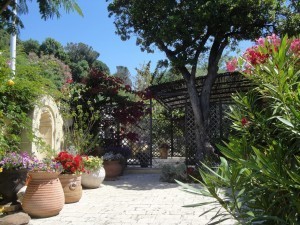 Outside my front door in France with the cuisine d’eté at the end. I love the profusion of colours that welcome guests as they arrive.
Outside my front door in France with the cuisine d’eté at the end. I love the profusion of colours that welcome guests as they arrive.

